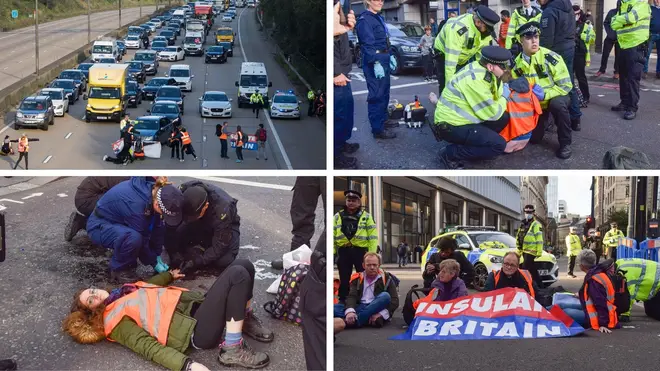
Tom Swarbrick 4pm - 6pm
10 May 2022, 00:06 | Updated: 10 May 2022, 11:00

The Government will set out plans to crack down on eco-protesters who "lock-on" to public transport infrastructure and glue themselves to roads in today's Queen's Speech.
The tactic has been used by protest group Insulate Britain in recent months, causing significant disruption to the country's roads and transport networks.
Under the plans, activists could face up to 12 months in prison.
A Public Order Bill targeting "guerrilla protests" will form part of Boris Johnson's legislative programme for the new parliamentary session.
READ MORE: The Queen will miss the State Opening of Parliament with Charles to take her place
READ MORE: First migrants to be told they're bound for Rwanda as Patel says plan sends 'clear signal'
Speaking on LBC's Nick Ferrari at Breakfast, Home Office minister Kit Malthouse said the protesters were not currently being adequately deterred by the current fines system because they tended to be "Waitrose card-holders" for whom a £1,000 penalty is "of no consequence".
"The offences that [the police] can prosecute people under don't carry deterrent sentences, so for example obstructing the highway, which was being used when people were blocking motorways, was a level three fine which was up to £1,000 with no threat of prison," he said.
"These individuals, they're often Waitrose card-holders and the money that they have to spend on fines is neither here nor there, so the deterrent effect isn't there, so what we're trying to do is bring more of a deterrent which previously we have done through some of the injunctions that we've obtained... but we need it encoded in the criminal law."
He added: "One of the things we've experienced is there are a number of these protesters who are very persistent, notwithstanding the fines and the penalties that are handed out they keep coming back again and again."

Minister explains plans to stop 'Waitrose card holding eco protesters'
He said protest was "key to our national identity and our democracy" but added it had to be "balanced against the rights of others to go about their business".
"What we're trying to do today through the Queen's Speech, through this bill, is strengthen the powers that the police have to deal with these protests so that there are proper penalties that will deter them taking place in the first place," he said.
It is one of 38 bills to be included in the Queen's Speech on Tuesday as the Prime Minister attempts to regain the political initiative after rows over lockdown parties and Tory losses in last week's local council elections.
The Queen will not be at the State Opening of Parliament, with Prince Charles standing in for his mother due to her health issues.
The new measure represents a bid to revive plans previously put forward under the now-passed Police, Crime, Sentencing and Courts Bill but had to be scrapped after being knocked back by the House of Lords.
In a sign of the Government's determination to drive through the measures, officials said the legislation could be introduced in Parliament as early as Wednesday.

Nick Ferrari destroys a climate change protester
Speaking during a visit to the Metropolitan Police specialist training centre in Gravesend on Monday, Home Secretary Priti Patel said ministers were determined to prevent protesters bringing the country to "a grinding halt".
"The law-abiding, responsible majority have had enough of anti-social, disruptive protests carried out by a self-indulgent minority who seem to revel in causing mayhem and misery for the rest of us," she said.
"These measures that we are bringing in will make sure that we can protect the public, protect lives and allow people to carry on with their business lives and to safeguard our critical national infrastructure."
The bill will create new criminal offences of "locking-on" and going equipped to "lock-on" to other people, objects or buildings in order to cause "serious disruption", with a maximum penalty of up to six months' imprisonment, an unlimited fine, or both.
A new offence of interfering with key national infrastructure - such as airports, railways and printing presses - will carry a maximum sentence of 12 months in prison, an unlimited fine, or both.

Insulate Britain protest: Nick Ferrari's take on how police should react
It will also become illegal to obstruct major transport works, such as the HS2 high speed rail link, again punishable by up to six months in prison, an unlimited fine, or both.
The bill will also extend stop and search powers so police can seize articles related to the new offences, while new serious disruption prevention orders will also be available for those who repeatedly cause criminal disruption.
Ahead of the Queen's Speech, Mr Johnson said it was part of a wider programme to get the country "back on track" after the pandemic while addressing the cost of living challenges.
"In spite of everything we have been through, we are going to ensure that over the two years we have left in this parliament, we spend every second uniting and levelling up this country, exactly as we said we would," he said.
"We will get the country through the aftershocks of Covid, just as we got through Covid, with every ounce of ingenuity and compassion and hard work."
The programme includes seven bills intended to capitalise on the benefits of Brexit by removing EU regulation covering areas from data reform to gene-editing to financial services.